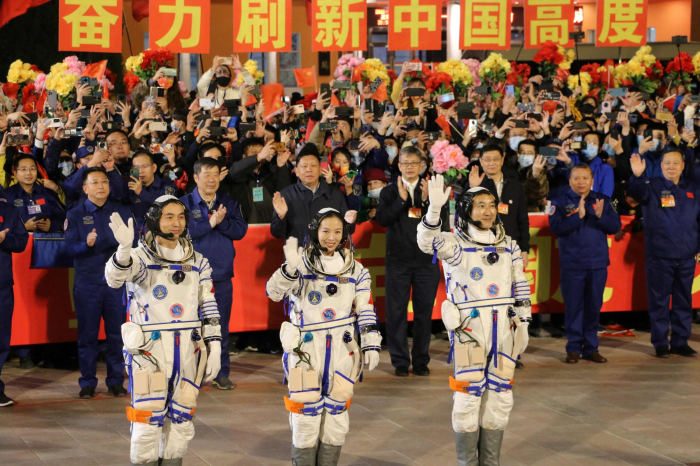China's longest crewed space mission ended successfully on Saturday as three "taikonauts" returned to Earth after spending six months in the Chinese space station.
The Shenzhou 13 space capsule landed in the Gobi desert in the northern region of Inner Mongolia, shown live on state TV.
During the 183-day mission, astronaut Wang Yaping carried out the first spacewalk by a Chinese woman. Wang and crewmates Zhai Zhigang and Ye Guangfu beamed back physics lessons for high school students.
China launched its first astronaut into space in 2003 and landed robot rovers on the moon in 2013 and on Mars last year. Officials have discussed a possible crewed mission to the moon.
On Saturday, state TV showed images from inside the capsule as it traveled at 200 meters per second over Africa before entering the atmosphere.
Zhai was the first to emerge from the capsule roughly 45 minutes after the landing, waving and grinning at cameras as he was lifted by ground crew into a specially designed chair before being bundled into a blanket.
"I'm proud of our heroic country," Zhai said in an interview with Chinese state broadcaster CCTV shortly after leaving the capsule. "I feel extremely good."
Mission commander Zhai, 55, is a former fighter pilot who performed China's first spacewalk in 2008, while Ye is a People's Liberation Army (PLA) pilot.
The trio were the second crew aboard Tiangong, or Heavenly Palace. Its core module, Tianhe, was launched in April 2021. Plans call for completing construction this year by adding two more modules.
Authorities have yet to announce a date for launching the next Tiangong crew.
China's previous record spaceflight mission length was set by last year's Shenzhou-12 deployment, which lasted 92 days. Six months will become the normal astronaut residence period aboard the Chinese space station, according to state broadcaster CCTV.
China is excluded from the International Space Station (ISS) due to the United States' unease that its space program is run by the ruling Chinese Communist Party’s (CCP) military wing, the PLA.
China was the third nation to launch an astronaut into space on its own after the former Soviet Union and the U.S. Tiangong is China’s third space station following predecessors launched in 2011 and 2016.
The government announced in 2020 that China's first reusable spacecraft had landed following a test flight but no photos or details of the vehicle have been released.
On Tuesday, President Xi Jinping visited the launch site in Wenchang on the southern island of Hainan from which the Tianhe module was fired into orbit.
"Persist in pursuing the frontiers of world aerospace development and the major strategic needs of national aerospace," Xi told staff at the site, all of them in military uniform.
Besides a space station, Beijing is also planning to build a base on the moon, and the country's National Space Administration said it aims to launch a crewed lunar mission by 2029.
While China does not plan to use its space station for global cooperation on the scale of the ISS, Beijing has said it is open to foreign collaboration, although the scope of that cooperation is not yet clear.
The ISS is due for retirement after 2024, although NASA has said it could remain functional until 2030.















































